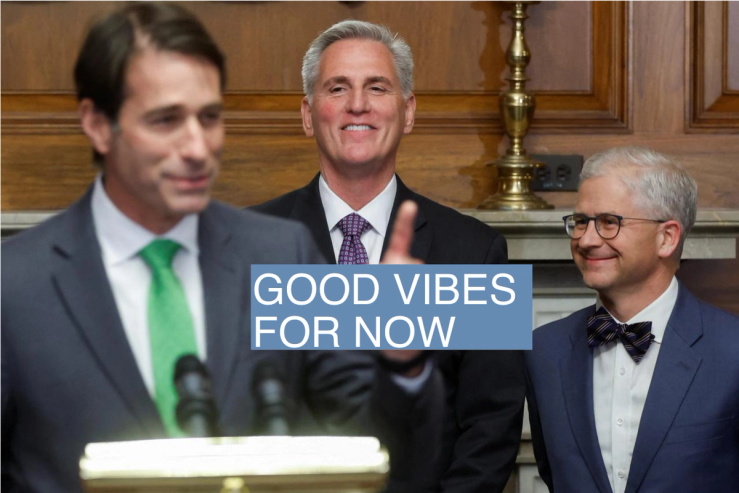The News
The dust is settling from a debt limit fight that consumed Congress for several months and the vibes are…surprisingly good. Both President Biden and Kevin McCarthy are getting positive headlines and the negotiators behind the debt ceiling deal have had nothing but nice things to say about each other, raising the prospect of bipartisan breakthroughs elsewhere.
“I think there is opportunity for goodwill,” Louisiana Rep. Garret Graves, a close McCarthy ally, told Semafor.
One looming clash: The debt limit bill pushes Congress to approve 12 separate appropriations bills — a legislative feat that hasn’t been accomplished since 1996 — by the end of the year or trigger a 1% across-the-board spending cut. Senate leaders Chuck Schumer and Mitch McConnell on late Thursday pledged to attempt to pass them.
But lawmakers also have a lengthy to-do list: There are must-pass bills, like the National Defense Authorization Act and Farm bill, which are each affected provisions of the debt ceiling agreement, as well as wish list items if the two parties can find common ground.
“I think both sides are happy if the temperature drops a little bit,” one Senate Democratic aide said. “The debt limit fight burned up a lot of oxygen for the first half of the year, but priorities that members wanted to get on in January might now have some room.”
In this article:
Our View
Here are a few things we’ll be watching:
China. Majority Leader Chuck Schumer laid out plans last month for a broad China package that could include provisions to scrutinize U.S. investments in the country and add new investments in domestic tech and manufacturing on top of the CHIPS and Science Act. There’s also still interest in legislation that would enable the Biden administration to restrict or ban TikTok and other foreign technology platforms, headlined by a bipartisan Senate bill from Mark Warner, D-Va. and John Thune, R-S.D. that’s backed by the White House. The new House select committee on China, meanwhile, is driving much of the discussion about China policy on the House side.
Permitting reform. The debt ceiling deal included a handful of reforms meant to speed up the permitting process for infrastructure and energy projects, such as new rules that will slap a time limit on federal environmental reviews. But the bill left many of the most difficult issues around permitting untouched, and McCarthy promised to keep working with the White House on a larger, bipartisan bill. Republicans are still looking for reforms that will make it easier to build pipelines; Democratic climate hawks want to smooth the path for new transmission lines necessary for the deployment of renewable power. A grand bargain still seems conceivable.
Rail safety. Ohio Sen. J.D. Vance is still plugging away at the bipartisan rail safety bill he introduced in the wake of the East Palestine disaster earlier this year. In May, it passed the Senate Commerce Committee 16-to-11. But in a sign of trouble, it only picked up two Republican votes on the panel, suggesting that even if it can clear the upper chamber, the legislation may have trouble making it through the House. We’ll see if it takes some revisions to get more GOP members aboard.
Ukraine aid. Getting another Ukraine aid package through the House may be the next big test of the Biden-McCarthy relationship. In the Senate, defense hawks are already eyeing a potential Ukraine bill as an opportunity to boost overall Pentagon funding they say got shortchanged in the debt ceiling deal. The exact timing of the White House’s next request is unclear, but a recent Pentagon accounting error bought the administration some time. One potential boost: The right’s most influential critic of Ukraine aid is off the air.
Farm bill. Sen. Debbie Stabenow, chair of the Senate Agriculture panel, recently told reporters that she considered any further debate over SNAP work requirements “over” after the debt limit deal tightened the rules for older Americans. But House Agriculture Chair Glenn Thompson, her Republican counterpart, told Semafor he might push changes in response to the debt bill’s new exemptions for veterans.
A.I. OpenAI’s Sam Altman certainly got the attention of Congress with his recent appearances discussing new regulation. Schumer put out a framework for possible regulations earlier this year, while McCarthy is highly interested in the topic and working to educate his members. Sen. Mike Rounds, R-S.D. and Martin Heinrich, D-N.M. will lead the Senate’s bipartisan AI Caucus. The two say they’re still at the information gathering stage, but are looking for ways to spur innovation in the industry while reining in potential dangers. “There is the need to maintain the technological lead that we have in AI because our competitors are not going to slow down,” Rounds told Semafor.
Room for Disagreement
Not everyone expects the goodwill to last long, particularly as the political calendar changes. “Honestly, we’ll see,” Rep. Byron Donalds, R-Fla. told Semafor. “I anticipate it could be short-lived since nothing divides this town like a presidential cycle.”


